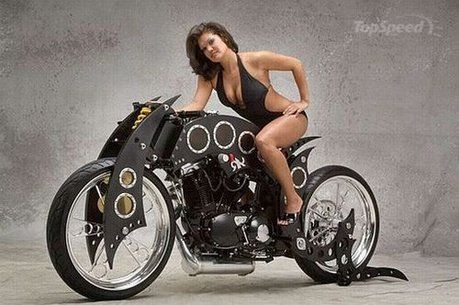 Arborists, lovers of wood, craftspeople, and aesthetes have always hankered for more Wood in their vehicles - witness the number of cars and motorcycles which have incorporated a bit of cellulose fiber into the structure or body of their products.
Arborists, lovers of wood, craftspeople, and aesthetes have always hankered for more Wood in their vehicles - witness the number of cars and motorcycles which have incorporated a bit of cellulose fiber into the structure or body of their products. Morgan cars come to mind immediately, as they are yet producing hand-made voiturettes with oak chassis beams to this day, following a very long tradition within the company.
Morgan cars come to mind immediately, as they are yet producing hand-made voiturettes with oak chassis beams to this day, following a very long tradition within the company. In the 1920's it was not uncommon to incorporate a bit of hardwood into motorcycle frame spars, not for any conceivable necessity, as it would be hard to justify filling a highly-stressed application with a material prone to cracking, rot, attack by critters, mildew, and of course, catching fire, a not uncommon occurence with open carburettor bellmouths, tickled floats, and ignition kickback!
In the 1920's it was not uncommon to incorporate a bit of hardwood into motorcycle frame spars, not for any conceivable necessity, as it would be hard to justify filling a highly-stressed application with a material prone to cracking, rot, attack by critters, mildew, and of course, catching fire, a not uncommon occurence with open carburettor bellmouths, tickled floats, and ignition kickback!  The reasoning, well, more likely the passion for using wood thus sprang from a deep love for the look and feel of an aged beam, rubbed and polished to bring out the figuration and luster.
The reasoning, well, more likely the passion for using wood thus sprang from a deep love for the look and feel of an aged beam, rubbed and polished to bring out the figuration and luster.
It's a passion I share, being a sometime restorer of wooden panelling and bannisters, and I frankly go weak in the knees when I see a tasteful bit of mahogany planking on the deck of a 'Launch' sidecar from the 1930's.


The builder of this wooden Vespa, Carlos Alberto of Portugal, obviously has an abiding love of and skill with the material as well - a few spots of home-layered ply are incorporated for strength, but much of the body is solid boarding, steamed, shaped, carved, sanded, and finessed into shape. Alberto purchased a rotted ca. 1948-53 125cc model, which used a headlamp mounted on the front mudguard, and set about remaking the machine in the materials of his trade.

'Color' has been added by the use of different woods; I would speculate mahogany, oak, and ash as primary ingredients; the effect is very Mod, reminiscent of Paul Smith's signature pinstripes. It's a master -work, and it runs - remarkable.

 .
. 















